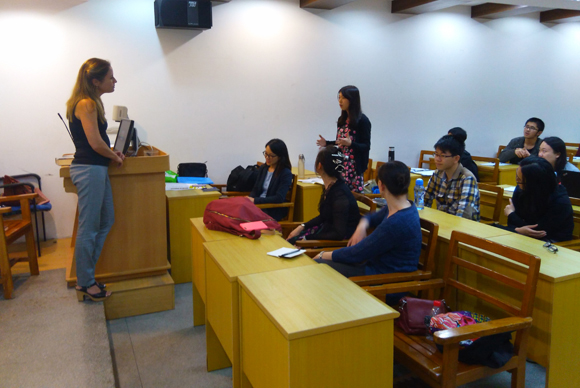When history and creative writing meet: Clare Wright talks shop with SYSU students
Source: School of Foreign Languages
Written by: Austin Woerner
Edited by: Wang Dongmei
Australian historian Clare Wright, author of the award-winning The Forgotten Rebels of Eureka, spoke to a packed lecture hall at the School of Foreign Languages on March 7 at Sun Yat-sen University (SYSU). Wright, whose work in history has been widely acclaimed not just as scholarship, but as literature, explained how she strives to “write women back into the stories about our past that we tell ourselves”—and in doing so, how she must think like a creative writer. The event was co-organized by the SYSU Center for English-language Creative Writing and by Australian Writers Week.

Wright’s quest to make women’s part in history come alive on the page began in earnest when she tackled a topic that every Australian learns about in grammar school: the Eureka Stockade. The incident, when the government massacred rebellious miners on the Ballarat goldfields in 1854, is regarded as one of the formative moments of Australian democracy—and has also traditionally been assumed to be a story primarily about men. Wright had a hunch that the existing histories, of which there were many, were only telling half the story. Despite skepticism from her colleagues, she set out to document the stories of the women who participated in the Eureka Rebellion.
After taking a break from the project to work on the documentary Utopia Girls: How Women Won the Vote, Wright said wryly that she returned to the voluminous manuscript to discover, in her words, “how horrible it was.” Drawing on what she learned as a TV writer—crafting scenes, building suspense, and keeping the audience engaged with characters—she set out to rewrite the manuscript in a way that would keep readers on the edge of their seats, while also staying true to the historian’s cardinal duty to accuracy. The result, The Forgotten Rebels of Eureka, has gone on to win numerous prizes.
She emphasized that there are ways to tell with integrity historical stories where many of the details are not known to scholars: "There’s this little thing called the question mark—it’s your best friend when you don’t actually know,” she said. Asking rhetorical questions about whether one of the women she was writing about might have done something—might have broken the ice on a frozen water bucket during a notoriously chilly winter, for instance—helped bring color and life to her tale without transforming it into fiction.
After walking through several interesting chapters of Australian history and covering a very large blackboard with pictures and maxims, Wright took questions from SYSU students and shared her newest project: helping write the screenplay for a TV drama based on Forgotten Rebels. “Just like doctors must pledge to do no harm, historians owe it to their readers to stick to the facts,” Wright said. It was hard to get used to at first, but now, she says, “I feel liberated—I feel like I’ve grown wings and can fly.”
